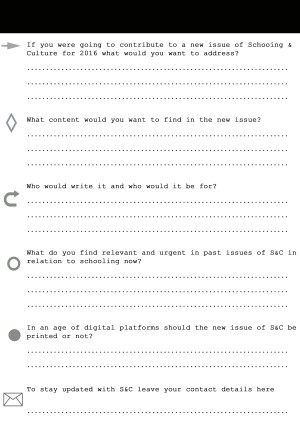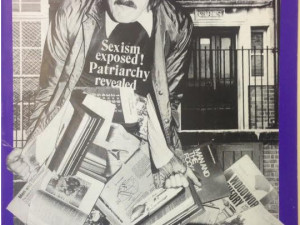Schooling & Culture
–

Since December 2014 the Schooling & Culture Working Group comprised of educators, artists, organisers and some of the original contributors, have been meeting to discuss the potential of reactivating the journal. The group have been collectively discussing what a new issue of the journal would look like, what would it be about, who would be involved and who would it be for?
In July 2015 Schooling & Culture Working Group took up residence at 88 Fleet Street, to host a week of workshops, collective readings, and meetings, finishing with a public event, to open up the discussion, socialise and further activate the archive. The ambition of these meetings was to explore the possibilities of producing a new issue. In addition to these facilitated workshops the Schooling & Culture Working Group invited young people, educators, writers and artists who have an affinity with the journal, to look through the archive and develop content.
During the Communal Knowledge at Work project in summer 2016 The Showroom hosted the Schooling & Culture Working Group for a week with Werker Magazine to collectively edit and produce the new issue of the S&C journal, a practical contribution to the current debate on the state of secondary education, working out its new position as follows:
*Schooling & Culture, a new journal concerned with secondary education, recognises a critical need for collective action towards models of avant garde political methodologies in the classroom. Schooling & Culture supports future generations to develop powerful, self-led practices of resistance and alternatives to those imposed by the state and the private sector.
Schooling & Culture seeks to:
— Strengthen networks against isolation and towards invigorating imaginative teaching and learning.
— Support teachers, parents, youth workers, young people and and those organising both structures and pedagogies against racism and fascism in light of Brexit and the refugee crisis.
— Work against hegemony sustained by exams, league tables, leadership, payment by results, and the threat of increasing selective schooling and privatisation.
— Continue the depth of cultural studies and expand on the breadth of radical and alternative educational practices and movements.*
